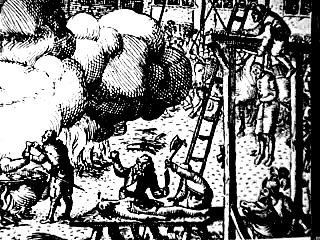

The Plot Generates a New PhilosophyFollowing the Gunpowder plot I suggest that the factor of terror introduced a greater concern for government into the equation with power sharing to be enforced by the power of the purse and effective government. The regional and local concerns of individual nobles was replaced by the wider concerns of national interest.  When power sharing promised by James was not forthcoming, the Catholic
would-be warlords realized that they needed to clear the field of both
the king and all of the other contenders for regional power in parliament.
Elaborate plans were made to capture, so as to dominate the rightful
successors to the throne, to get that power flowing toward them once again.
Foreign monarchs had rejected their cause. They were forced to
re-constitute the power structure internally, to their advantage. They
chose, however, a new
and untried plan. Never before had the entire power system and value
structure been attacked at once. Never had gunpowder been involved. The
man in the street, whose mind was still occupied with the contemplation
of the sin of regicide via Shakespeare's Macbeth, thought, "What would god think
and do to a nation which had almost allowed so many divines to be killed
at once? Would the chaos bring down the very roof over his or her head?
Would it end the empowerment brought by the state to merchant and to
a certain extent to peasant as well? Their actions signaled the beginning
of the end of Elizabethan court politics.
When power sharing promised by James was not forthcoming, the Catholic
would-be warlords realized that they needed to clear the field of both
the king and all of the other contenders for regional power in parliament.
Elaborate plans were made to capture, so as to dominate the rightful
successors to the throne, to get that power flowing toward them once again.
Foreign monarchs had rejected their cause. They were forced to
re-constitute the power structure internally, to their advantage. They
chose, however, a new
and untried plan. Never before had the entire power system and value
structure been attacked at once. Never had gunpowder been involved. The
man in the street, whose mind was still occupied with the contemplation
of the sin of regicide via Shakespeare's Macbeth, thought, "What would god think
and do to a nation which had almost allowed so many divines to be killed
at once? Would the chaos bring down the very roof over his or her head?
Would it end the empowerment brought by the state to merchant and to
a certain extent to peasant as well? Their actions signaled the beginning
of the end of Elizabethan court politics.
The Birth of Terrorism Right or wrong, the state was a comforting system. The shaking of it's
foundation was the terror, rooted in the divine, in economics,
and within the management of the very environment of life. This is the
feeling, perhaps, was the one which we still feel today in the wake of terrorist
acts. The very framework of life itself is threatened by those who are in
pursuit of a cause. The cause itself is belittled beyond invisibility by
the impending atmosphere of catastrophe.
Right or wrong, the state was a comforting system. The shaking of it's
foundation was the terror, rooted in the divine, in economics,
and within the management of the very environment of life. This is the
feeling, perhaps, was the one which we still feel today in the wake of terrorist
acts. The very framework of life itself is threatened by those who are in
pursuit of a cause. The cause itself is belittled beyond invisibility by
the impending atmosphere of catastrophe.
 Even without an explosion, that feeling was let loose by the Gunpowder
plotters for the first time. The consequences of the act became therefore
much greater than the values of estates and treasure forfeited,
rights lost to future generations and the lives lost to torturous
execution. Gone was a trust in the divines and the march was on toward an
insistence upon accountability of the ruler and the necessity of the
provision of government in exchange for power.
Even without an explosion, that feeling was let loose by the Gunpowder
plotters for the first time. The consequences of the act became therefore
much greater than the values of estates and treasure forfeited,
rights lost to future generations and the lives lost to torturous
execution. Gone was a trust in the divines and the march was on toward an
insistence upon accountability of the ruler and the necessity of the
provision of government in exchange for power.
 When London awoke in the early hours of November 5 1605, it was to an
alarm the likes of which had never been heard. Real devils of the
"devilish Pope" had threatened to bring chaos to government and to the
world as the English knew it. The conspirators had employed the most
destructive technology possible, the atom bomb of its day, gunpowder. What
was the world coming to?
When London awoke in the early hours of November 5 1605, it was to an
alarm the likes of which had never been heard. Real devils of the
"devilish Pope" had threatened to bring chaos to government and to the
world as the English knew it. The conspirators had employed the most
destructive technology possible, the atom bomb of its day, gunpowder. What
was the world coming to?
 The conspirators knew that they risked the ultimate wrath of the people.
They risked the cruelest punishment ever devised by man, being dragged head down
behind a horse through the streets, hanging until only half
dead, disemboweling while still alive, quartering while still twitching
and being dipped piece by piece in hot tar. All conducted as a public
spectacle.
The conspirators knew that they risked the ultimate wrath of the people.
They risked the cruelest punishment ever devised by man, being dragged head down
behind a horse through the streets, hanging until only half
dead, disemboweling while still alive, quartering while still twitching
and being dipped piece by piece in hot tar. All conducted as a public
spectacle.

Execution of Plotters With the terror was born on the 5th of November 1605 the persona of
the Freedom Fighter. While Europe had seen the crusades with men going
to war for god and the divine king, the bold liberator was a more novel
figure. It did not take a super hero. Ordinary people could place the
world upon the brink of chaos. One can not help but admire the plotters
for their determination and daring and possibly even bravery. Our ability
to touch off that gunpowder today still remains very real. So real that it
has become the supporting foundation for our Democratic state and the
principal behind the right to bear arms and be ready to confront tyranny
with "people power" and violence. The terror born in 1605 is the deterrent
which has given the man in the street freedom from tyranny. However, it
has also given him a new access to chaos and has demonstrated to us all in
recent years that the common man with a bomb is no more perfect than the
divine absolute ruler or noble of 1605.
With the terror was born on the 5th of November 1605 the persona of
the Freedom Fighter. While Europe had seen the crusades with men going
to war for god and the divine king, the bold liberator was a more novel
figure. It did not take a super hero. Ordinary people could place the
world upon the brink of chaos. One can not help but admire the plotters
for their determination and daring and possibly even bravery. Our ability
to touch off that gunpowder today still remains very real. So real that it
has become the supporting foundation for our Democratic state and the
principal behind the right to bear arms and be ready to confront tyranny
with "people power" and violence. The terror born in 1605 is the deterrent
which has given the man in the street freedom from tyranny. However, it
has also given him a new access to chaos and has demonstrated to us all in
recent years that the common man with a bomb is no more perfect than the
divine absolute ruler or noble of 1605.
 There had been plots before, but this one was different. It did not merely
threaten a king, or a group of nobles. It brought terror to everyday lives
and to the streets of the capital. It seemed as if demons had been
let loose.
There had been plots before, but this one was different. It did not merely
threaten a king, or a group of nobles. It brought terror to everyday lives
and to the streets of the capital. It seemed as if demons had been
let loose.
 Let us explore some of the earlier rebellions. We will see how
rebellion had become a fact of life for England and how the Gunpowder
plot represents not a new development, but the full blown development
of the state as constructed by Elizabeth.
Let us explore some of the earlier rebellions. We will see how
rebellion had become a fact of life for England and how the Gunpowder
plot represents not a new development, but the full blown development
of the state as constructed by Elizabeth.
Durst, Paul. Intended Treason, W. H. Allen, London, 1970. Hey? What have you done lately? Let us know! |
|
| |||||
|---|---|---|---|---|---|
| Home | Terrorism | Policy | Definitions | Divine Right | Elizabeth |
| Devaluation | Philosophy | Essex | Present | News | Feedback |